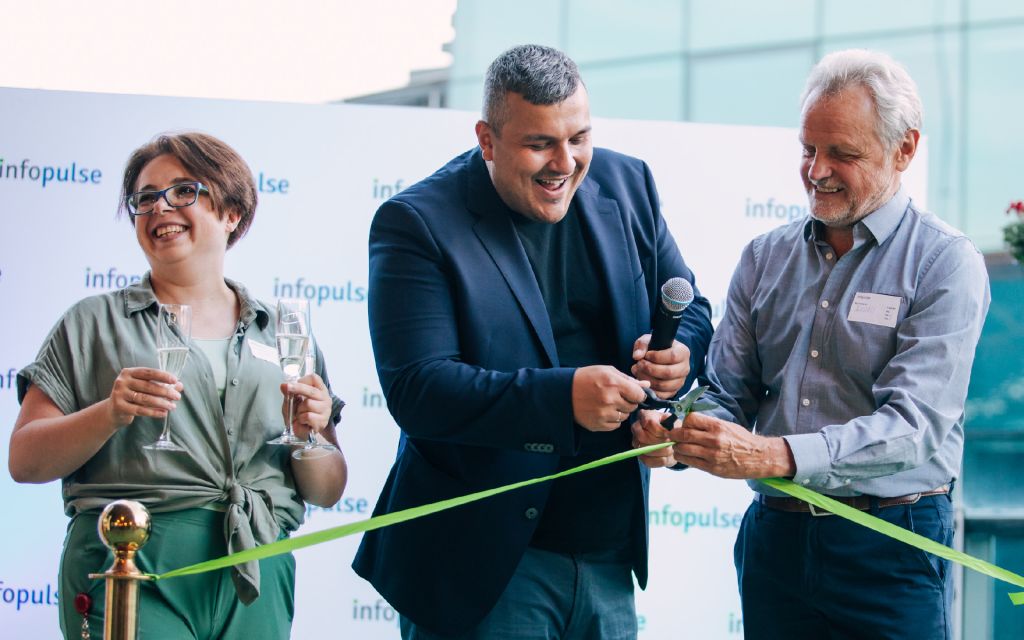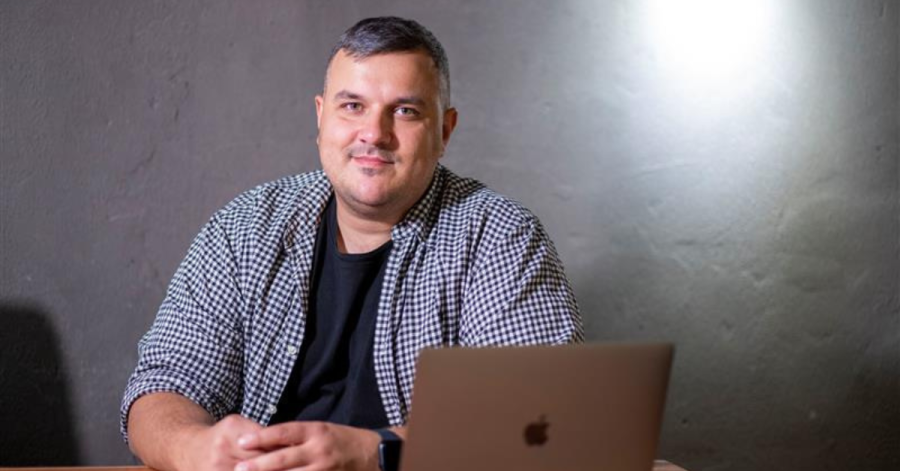Anton Volik, the company’s Managing Director for Infopulse Bulgaria, shares with us Infopulse’s vision for the future and the development of the Bulgarian tech landscape.
More than 300 IT companies developing their operations, this is what a look at Glassdoor shows us. The number of vacancies for different positions in these companies exceeds 3,000. Stats like these confirm Sofia’s status as one of the fastest-growing IT destinations in Europe. One of the latest additions to Sofia’s list of tech companies is Infopulse Bulgaria.
The company has been operating in the Bulgarian market since 2015. The maiden office was in Varna and Bulgaria is the place that marked the start of Infopulse’s internationalization. Ranked as one of the Top 100 outsourcing companies globally, the firm has more than 2,000 employees globally and more than 280 clients.
Last week, The Recursive joined Infopulse’s office opening in Campus X and discussed with Anton Volik more about the road of the company so far and what lies ahead. Anton is Head of Customer Experience at Infopulse and Country Manager at Infopulse Bulgaria. We spoke about the Bulgarian division’s goals for the future, why they collaborate with local enterprises, and how Sofia’s tech landscape has evolved in the past few years.
Hey, Anton, let’s start with the big news – Infopulse is opening an office in Sofia. Can you tell us more about why the company decided to take this step? Which factors led to the decision?
Anton Volik: We decided to open an office in Sofia to create an environment where our colleagues from the city can gather and exchange ideas. Infopulse has been present in the Bulgarian market for 8 years, but as we started to expand our operations in the country we saw the need for a place where our colleagues could meet and interact in person.
Actually, Bulgaria was the first country in Infopulse’s internationalization back in 2015, as we believe that the potential of local professionals is very high. Since I joined the company 3 years ago, we have taken a path to steady and sustainable expansion in Bulgaria. Now, we have over 60 professionals working in Bulgaria, doubling our team for two consecutive years.

With the opening of the new office, what are Infoulse Bulgaria’s goals for the next 12 to 18 months?
Our main goals for the next two years are divided into two segments – establishing internal capacity and attracting new clients. We plan to grow our headcount to about 100 professionals in the next 18 months. Our top priority positions are Java engineers and DevOps specialists. We also focus on professionals with a background in Telecommunications or the Banking, Financial services and Insurance industries.
To achieve this, we strive to develop meaningful relationships with other stakeholders in the industry, as we want to support the overall growth of the Bulgarian economic and technological landscape. Some of the key players we collaborate with are universities, educational organizations, and event organizers, so we can share what we’ve learned in our experience and encourage other people to start developing in the field.
Another important aspect of our work in Bulgaria is continuing to collaborate with local businesses from the BFSI (Banking, Financial service, Insurance) industries to help them develop digital solutions for their customers. Also, we plan to boost the level of expertise in our team in the telecom industry.
You’re not a traditional outsourcing as you develop all business functions in Bulgaria. Can you tell us more about this approach? What impact do you want to achieve by implementing this?
At the core of our motto and vision stand that we want to achieve business results for us and our clients, and we want to make the environment around us a better place to live in. So, our approach in Bulgaria is to support the digitalization of the country and improve digital literacy in the country. Around 30% of the whole population of the country has at least basic digital skills, which is almost 2x lower than the average rate in the EU. Our goal is to help local companies in expanding their knowledge and skills in the digital field. This will help the overall economic situation in the country and provide professionals with higher-paid jobs and businesses with the right tools to adapt to the digital world.
As Infopulse is an international company with Ukrainian roots, how has the war affected the organization? Tell us more about how you’re dealing with the situation.
The full-scale war in Ukraine affected us in lots of different aspects. The most important is our people, our most valuable asset. From the first hours of the war, we activated our business continuity plan with the purpose of relocating our people abroad and helping them settle into their new environment. It was a stressful time for all of us and we needed to act fast, as we ensured that our teams and their families were safe.
Although we had experience in remote work before that, with the onset of the war we had to adapt lots of processes and optimize how our distributed offices work.
Anton, you mentioned that Infopulse is actively supporting educational organizations. Tell us more about the educational system in Bulgaria and your decision to collaborate with these institutions.
Contradictory to the low level of digital literacy, the education system in Bulgaria is at a very good level. Even from my first interactions with locals, especially young people, I was amazed at the high level of English they spoke. Together with that, there are lots of organizations that provide formal and informal education in specialized topics.
As our business is growing and we’re at the beginning of collaborating with international telecoms, we’re happy to partner with the High College of Telecommunications and Posts, where we can speak with lots of young people who have a good understanding of the sector and are eager to make their first professionals steps.
Collaborating with universities also means a lot of young talent is among the priority areas. Can you walk us through the process of how Infopulse Bulgaria helps young people grow & develop professionally?
At Infopulse, we have a dedicated team that is responsible for helping all new employees who join our company to adapt faster. We want them to feel part of our culture and our team as fast as possible.
We developed a practice that trainees and juniors have an internal mentor from the company who is at a higher seniority level. That provides an opportunity for young people to ask all kinds of questions – from company languages to programming challenges or career advice. That way they can build a solid knowledge base that will allow them to become better professionals. Ivailo Ivanov, Infopulse’s JavaScript Developer, is one great example of our approach – he started his journey with Infopulse Bulgaria 3 years ago as an intern, and now he’s a mid-level JavaScript developer. He recognized that the support from the managers was super helpful to him and he’s eager to keep learning more.
Infopulse operates in 7 countries across 3 continents, how do you manage to foster successful international collaboration between the different teams?
It’s not an easy task when you have to coordinate people who live so far apart and even sometimes it’s hard to schedule an online meeting. This is the key role that Country managers play. It’s our responsibility to convey the big mission and vision of the company to the local professionals. Every person in this position has to have a deep understanding of local specifics and also how Infopulse operates and it’s approach to solving different tech problems.
Anton, you joined the company several years ago and became the Managing Director. What are your observations about how the local tech & IT ecosystem has developed in the past 5 years?
The tech landscape in Bulgaria has developed quite a lot in the last 5 years. A lot of international companies have entered the country and provide excellent opportunities to learn from global players. This helps the local economic situation and showcases the country as a frugal R&D destination that helps international companies grow.







